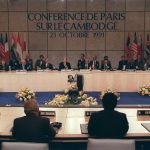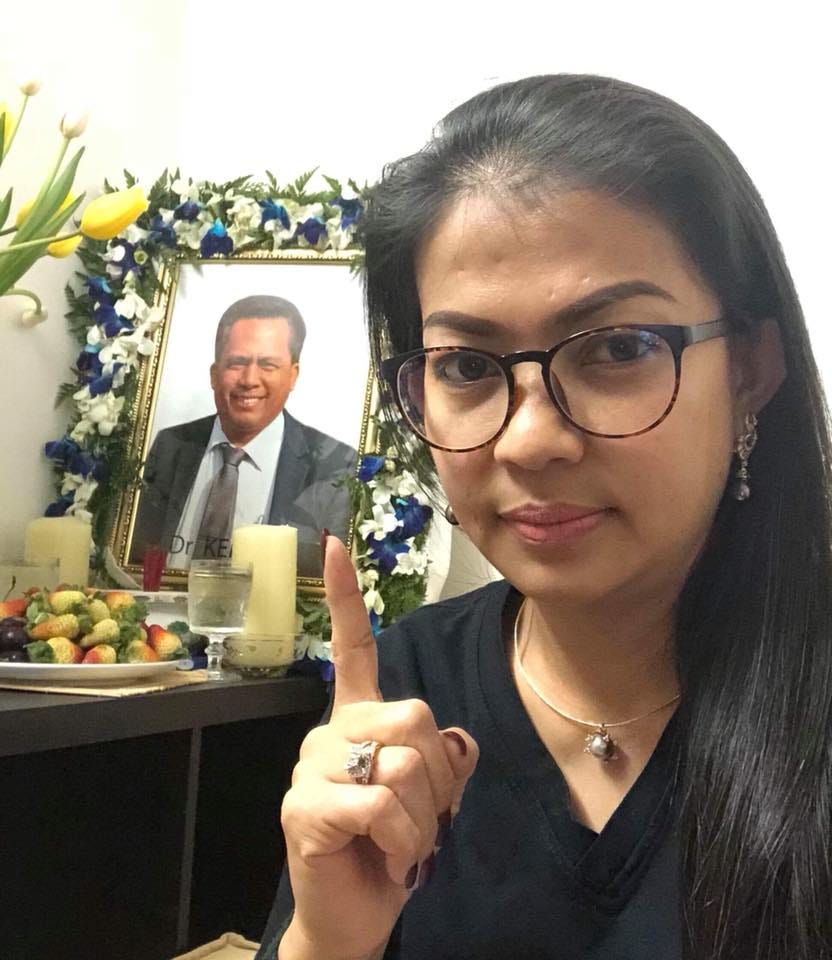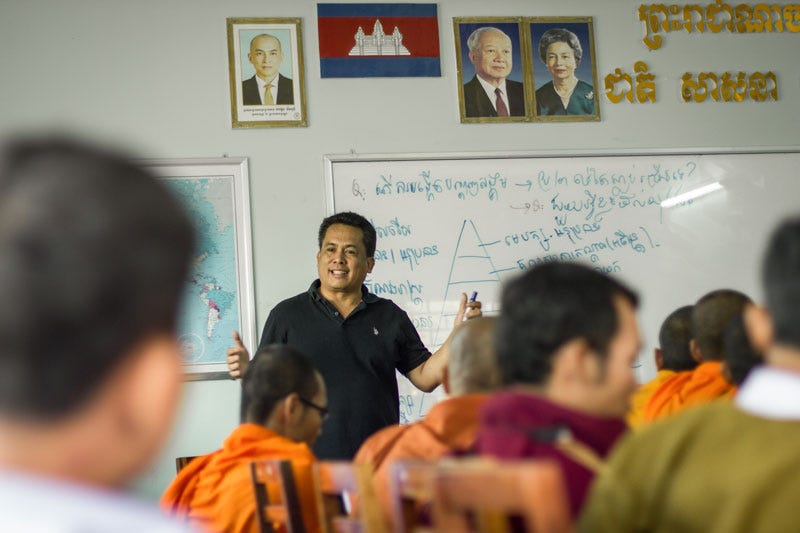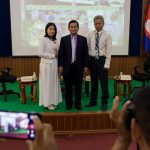Cambodia election 2018
now browsing by tag
The Future of Cambodia’s Opposition
Op-Ed: Medium
Clean fingers
Choice of Cambodian Voters for this July 29, 2018 election
 The GDP was founded in August 2015. A year later, its chief architect, Kem Ley, was assassinated in broad daylight in Phnom Penh on a Sunday morning.
The GDP was founded in August 2015. A year later, its chief architect, Kem Ley, was assassinated in broad daylight in Phnom Penh on a Sunday morning.
The popular social commentator was on July 10, 2016, shot in the temple and beneath his arm from point-blank range moments after sitting down for a gas-station coffee in a Caltex in central Phnom Penh — a twice-daily ritual.
After her husband’s death, a pregnant Bou Rachana fled with her four young sons to Bangkok, where she gave birth to a fifth son. She was then last year granted a visa to move to Melbourne, Australia, where she now lives and has slowly started to speak out on social media.
Crushingly for Saing Koma and Inn, Rachana has sided with the CNRP.
Two days after the GDP selected Saing Koma as it candidate for prime minister in the July 29 election, Rachana took to Facebook to post a selfie showing a raised forefinger — symbolically unblemished by the ink used to stain fingers to prevent people voting twice — to declare her stance.
The image of the raised finger, which has become an increasingly popular gesture for pro-boycott voices in the face of government threats (named the “Clean Finger” campaign), was widely shared by Cambodians.

Then in an interview with Radio Free Asia a week later, she said she believed her husband too would have boycotted the vote.
“We are citizens, we have Cambodian blood, and we are the masters of our nation and owners of our ballots,” she said in the interview. “We have the right to decide [who to vote for] according to the desire of our hearts,” she said.
It was a victory for the CNRP, not least because Rachana and her sons attracted intense pity from Cambodians across the political aisle. But it was also a symbolic victory because Kem Ley’s shadow still looms over Cambodia as a memory of a time when things finally seemed to be improving.
Unusually for a Cambodian in the political spotlight, he had strived to keep up an reputation of independence between the government and opposition, believing that Cambodia would forever be kept under the thumb of foreign powers if no one stood up to unite its leaders in common cause.
For many who had tired of watching Hun Sen and Sam Rainsy bickering for the past two decades, he was a breath of fresh air. Only a lowly adviser in the Health Ministry shortly before the 2013 election, he quickly built a large following with his readiness to criticize the CPP and CNRP in equal measure.

Differences in the CPP
Kem Ley’s message had seemed to be seeping through to both parties.
On the back of Kem Ley’s advice, the CNRP’s Sokha announced that tycoons who had grown rich under the CPP would not fear reprisals or seizures of their wealth if the CNRP came to power but had to be open to reform.
The interior minister has long been Hun Sen’s main rival for power in the CPP, after inheriting a vast patronage network centered on his ministry and in Battambang province in the west from his brother-in-law — the CPP’s late founding president Chea Sim, who died in 2015.
According to Brad Adams, who was a U.N. official in Phnom Penh in the 1990s and is now deputy head of Human Rights Watch for Asia, Kheng and his allies even refused to join in Hun Sen’s ouster of his Funcinpec coalition partner, Prince Norodom Ranariddh, in the 1997 factional fighting.
His arrest would cause chaos, he said, and police must prevent chaos. It appeared to be a major opening in the spirit of promoting reconciliation between the parties promoted by Kem Ley, but the reprieve was short lived.
The next day, the Air Force’s Chinese-built helicopters and Navy speedboats circled the CNRP’s riverside headquarters, where the opposition leader had been in hiding from Hun Sen’s threats for months. In front of the building, balaclava-clad soldiers from Hun Sen’s elite personal bodyguard unit clasping AK-47s repeatedly drove past to hammer home the message.
Posted in Culture, Economics, Education, KR Trial, Leadership, Politics, Researches, Social | Comments Off on The Future of Cambodia’s Opposition
Tags: Cambodia election, Cambodia election 2018
The hard choice facing Cambodia’s opposition voters
The hard choice facing Cambodia’s opposition voters

Featured image by Southeast Asia Globe after a photograph by Erika Pineros
Interviews conducted by Southeast Asia Globe across three provinces revealed a growing climate of fear driven by local CPP officials allegedly abusing their power to deprive suspected opposition supporters of essential government services. Those who have grown frustrated with 30 years of CPP rule now find themselves forced to choose between being complicit in an election they see as illegitimate and facing the consequences a boycott could bring down on their families.
The Butcher claimed that his local commune officials had threatened to withhold their services as essential notaries and mediators to citizens not bearing the telltale ink on their index finger following this month’s commune elections.
“If you’re not going to vote, they say, you’re not a legitimate citizen,” he said. “So they mark down your name and they don’t help you with papers or approval on anything.”
Commune councils are responsible for ensuring their constituents have access to essential health and social services, and oversee the bureaucracy of day-to-day life. Commune chiefs, deputies and clerks serve as mediators in business and family life, overseeing marriages and divorces. Hun Sen’s Cambodia author Sebastian Strangio said that the ruling party had long used its stranglehold on local government to pressure Cambodian citizens.
“In the past, the CPP has used its local organisations and working groups to forcibly enroll people in the CPP, as in the ’93 and ’98 elections,” he said. “I presume the CPP will deploy the many local government and party offices to encourage people to come out and vote.”
==
“It’s bad, because we have been discussing not going to vote,” he said. “But we also have a backup plan: we go and scratch the papers [leaving the ballot blank or invalid]. But I’m afraid they’re going to count that as a ruling-party vote. I feel very hopeless. I don’t know what to do.”
With the CNRP leadership in prison or scattered across the globe, and the nation’s military and police dominated by the ruling party, it seems unlikely that a CPP win would be greeted by the same widespread street protests that followed the controversial 2013 result. Strangio said that for many Cambodians, ways of expressing dissatisfaction with the CPP’s actions were running thin.
“What we are more likely to see than an uprising in the street is this sort of passive resistance where people drag their feet,” he said. “People have been doing this for years – this isn’t a new thing. When you talk to people in villages, they will express critical views of the CPP and the authorities and a great deal of skepticism about their pretensions and claims. Whether that actually affects the CPP’s grip on power in this election remains unclear. I do think a boycott is a potentially embarrassing thing for the CPP if it gathers momentum and a large portion of the public buy into it.”
===
For the Barber, it’s not enough. Staring out across the dusty roads of Sen Sok, he describes a future that feels all too familiar to those who have grown up under the thumb of a one-party state.
“It’s just a one-man show – you’ll win anyway, and so no one is going to criticise you,” he said. “You don’t know what flaws you have. If there were a strong opposition party like before, there would be someone to criticise you and your policies and have some impact on decision-making in parliament, but now you’re alone – you don’t know what you lack or how you could make it better. You just live in your own world. Everything else, you’ve shut down.”
Read more details at Southeast Asia Globe…
Posted in Economics, Education, Leadership, Politics, Researches, Social | Comments Off on The hard choice facing Cambodia’s opposition voters
Tags: Cambodia election 2018
News collection on Cambodia election as of today 12 July 2018
PHNOM PENH, Cambodia — It’s election season in Cambodia, and the fireflies are out.

Loung Chengda, left, of the Khmer Republican Party, and In Chhaom, right, of the Cambodian Light Party, at a June campaign debate with Kin Phea, the moderator. Twenty parties will be on the ballot in the July 29 national election, but Mr. Hun Sen’s is the only one most voters have heard of.CreditAmanda Mustard for The New York Times
Cambodians use that term — “ampil ampik,” in the Khmer language — to refer to little-known political parties that flash onto the scene shortly before an election, then fade back into obscurity.
Twenty parties, some just a few months old, will be on the ballot when national elections are held this month. But most voters will have heard of only one: the Cambodian People’s Party, led by Hun Sen, the authoritarian prime minister.
Mr. Hun Sen has had no viable opposition since November, when the Cambodia National Rescue Party — which almost won the 2013 election — was dissolved by a court packed with his loyalists. The United Nations special rapporteur on Cambodia, Rhona Smith, and numerous rights groups have said the July 29 vote will not be legitimate.
In response, the government points to such obscure entities as the Dharmacracy Party, the Khmer Will Party and the New Light Party (whose platform is to promote “Cambodia’s natural, linguistic and alphabetical wonders”).
Read more on The New York Time…
=========
The question many Cambodians are asking themselves ahead of this month’s general election is not so much which party to vote for but instead whether they should vote at all.
It’s all but certain that the ruling Cambodian People’s Party (CPP) will win the election to be held on July 29 as its only viable rival, the Cambodia National Rescue Party (CNRP), was dissolved by court order several months ago.
In November, the Supreme Court ruled to disband the CNRP after it was accused of trying to foment a “color revolution” aimed at toppling Prime Minister Hun Sen’s CPP-led government.
Most of the CNRP’s politicians who were banned from politics for five years on court order have since fled the country while its president, Kem Sokha, languishes in prison on what are widely viewed as trumped up treason charges.
Now, CNRP officials have from exile called on Cambodian voters to boycott the upcoming election in a “clean finger” campaign, reference to the indelible ink used at ballot stations to indicate a person has voted. The goal, party members say, is to show that the upcoming election is a sham.
Originally intended to prevent the same person from voting multiple times, inked fingers have now come to connote a different form of electoral fraud in Cambodia, say analysts.
Read more on Asia Times…
=======
The emails were believable. An interview request for a member of the opposition. An article sent to a government official. A conference invitation for a journalist. But each one a hacking attempt designed to lure the recipient.
Over the past few months, numerous rights groups, reporters and Cambodia observers have reported seeing a large spike in phishing messages and hacking attempts. Now a report from a leading U.S. cybersecurity firm suggests such cases may be linked to a large scale operation from a Chinese cyber espionage group seeking to monitor the country’s upcoming and contentious July 29 national elections.
In a report released Wednesday, FireEye details how a well-known Chinese hacking group called TEMP.Periscope targeted opposition figures, government departments, rights defenders and media outlets. Among those compromised by the attacks was the Cambodian National Election Commission, Interior Ministry, diplomats and opposition lawmakers. In the past, the group has gone after corporations, academics and defense contractors in the U.S., Europe, Taiwan and Hong Kong. FireEye, which has been studying TEMP.Periscope since 2013, said there can be little doubt they are working on behalf of the Chinese government.
“The evidence we have gets us as far as information gathering, it definitely shows that China is very interested in the upcoming elections,” Benjamin Read, Senior Manager for Cyber Espionage Analysis at FireEye, tells TIME.
China is a close ally of Cambodia, and has invested billions in infrastructure, development, military support and aid. “Any upheaval in Cambodia would be an issue for China considering their close partnership,” says Read, pointing to the recent election in Malaysia — in which the surprise outcome has caused a headache for Beijing with billions of dollars in infrastructure and construction contracts now being reevaluated.
Such an outcome is unlikely in Cambodia, where the government last year dissolved its only viable political competition, the Cambodia National Rescue Party, and imprisoned its leader Kem Sokha. But the surveillance nevertheless highlights China’s deep interest in the inner workings of both friends and foes.
Read more on Time…
Posted in Economics, Education, Leadership, Researches, Social | Comments Off on News collection on Cambodia election as of today 12 July 2018
Tags: Cambodia election 2018











